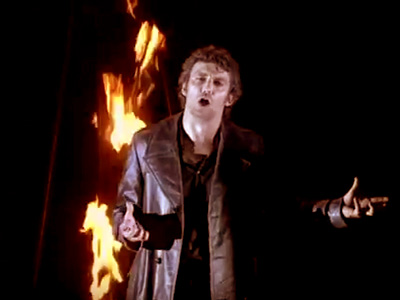
By ANDREW POWELL
Published: June 28, 2013
MUNICH — It helps when two of Caruso’s “four greatest singers” live nearby, the more so when they act as capably as they sing. That was the edge enjoyed by Bavarian State Opera in restaging Verdi’s Il trovatore to open its 138-year-old Munich Opera Festival yesterday, one of no fewer than 17 operas by Verdi and Wagner to be given here in the next 35 days. But leave it to Nikolaus Bachler — gifted narrator, sometime actor, and guiding light at this, Germany’s richest and busiest opera company — to OK a staging scheme that substitutes Age of Steam vaudeville and farce for 15th-century Aragón and Vascongadas melodrama, black-on-black sets and glaring white-neon slashes for Latin color, rootless stand-ins for impassioned characters.
French régisseur Olivier Py “focuses on the darkness, nightmare and horror of the story,” making use of a rotating four-level unit set, with add-ons and modular subtractions as events unfold. Engaging for a while, the unit unavoidably out-twirls its welcome and by Parts III and IV, bereft of sufficient new dramaturgical thought, it is largely shunted aside. Sooner than that, however, Py’s translocation trivializes the tale. Ferrando’s story-setting — the sleeping babies, the gypsy hag and all — plays on a vaudeville stage-within-the-stage to men in suits and ties. After an Anvil Chorus sparked by hammerings on a steam locomotive, all depart, leaving Azucena to wail her own backgrounder (Stride la vampa!) with no audience. Leonora’s rescue from a convent future misfires as a result of action split onto two non-competing levels, and Manrico’s execution confounds all situational logic. Ah well, at least there is Azucena’s nude mom-ghost as constant company.
Those locals, Anja Harteros* and Jonas Kaufmann, made their scenic role debuts amid this nonsense. It was her night, not so much the troubadour’s, but both sang with consistent beauty of tone and expressive point. Aided by conductor Paolo Carignani, the Greek-German soprano delivered a luxuriant, pleasingly inflected Tacea la notte placida and later fairly milked D’amor sull’ali rosee, bringing down the house. Then Carignani, otherwise robust of purpose, failed to inject tension for the Miserere and Leonora’s ensuing stretta fell flat. Kaufmann traversed his seventh Verdi role with power to spare. Ah sì, ben mio, sung against a reflecting board, drew best use of his bronzed timbre and deft messa di voce. On the phrase O teco almeno he mustered (to these ears**) a high B‑flat and held it without strain for four seconds. He refused to push for volume in the All’armi! — a smart Manrico, no mad thriller.
Caruso’s quartet found completion in relative veterans Elena Manistina and Alexey Markov, an Azucena and Conte di Luna pairing at the Met this past January. She unquestionably has the chops for the gypsy — contralto with an extended top, more than mezzo-soprano as marketed — but she did not yesterday convey terror, horror or motherhood. After an impeccable Il balen del suo sorriso, Markov’s unified, rich baritone seemed to fade. He came nowhere near to matching Harteros in the sexually charged sequence Mira, di acerbe lagrime … Vivrà! contende il giubilo, the evening’s one serious musical setback. Years of Bayreuth duty have sadly lodged a beat in Kwangchul Youn’s warm and solidly trained bass. Still, as Ferrando on that vaudeville stage, he gamely and vividly introduced the story (Di due figli vivea padre beato) to Py’s implausible audience.
Carignani lifted Verdi’s lines and mostly kept the rhythms alive and taut. He favored light textures, kindly supporting the voices but depriving the string sound of bottom and resonance. The Bavarian State Orchestra played well for him; the chorus sang in unclear Italian with fair discipline. During intermission, Manistina and Kaufmann silently indulged the director in an onstage magic-trick box-sawing of the tenor’s body. Fortuitously, maybe, this passed with little notice, as the well-dressed premiere throngs were still out sipping wine, munching canapés and spooning Rote Grütze mit Vanillesoße.
[*Munich is artistic home for the soprano. She lives in Bergneustadt.]
[**For Associated Press, Mike Silverman reports a B-natural in his interview-cum-review. Annika Täuschel, reporting for BR Klassik, claims Kaufmann actually sang a high C yesterday: “Er singt es, das hohe C!”]
Still image from video © Bayerische Staatsoper
Related posts:
Safety First at Bayreuth
Manon, Let’s Go
Boccanegra via Tcherniakov
Time for Schwetzingen
Busy Week
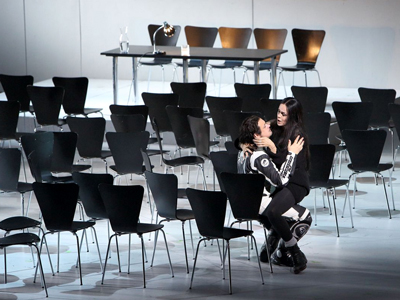
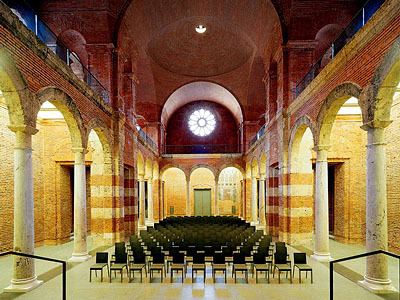
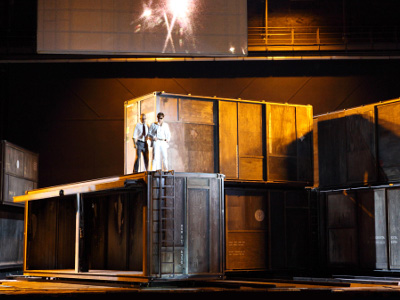
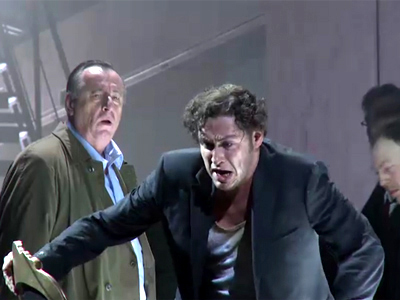


Portraits For a Theater
Sunday, October 13th, 2013By ANDREW POWELL
Published: October 13, 2013
MUNICH — Next Wednesday (Oct. 16) new portraits go on display in Bavarian State Opera’s lobby. Twenty-one new portraits.
Astrid Varnay, Dietrich Fischer-Dieskau, Kurt Moll, Brigitte Fassbaender, Lucia Popp, Edita Gruberová, René Kollo, Hildegard Behrens and Waltraud Meier are among the worthy singing subjects, company troopers all.
But theatergoers expecting traditional oils on canvas in pretty frames may be in for a shock.
The new dauerhaft pieces embrace painting, drawing, tapestry, photography, hot wax, and at least one video requiring its own flat-panel display, to be hung in a hall that once serenely separated our electronic world from the madness on stage.
To create space in the company’s 114-year-old portrait collection, fifteen tired canvasses recently disappeared into das Lager des Theatermuseums, a.k.a. deep storage, leaving bare walls.
Safe, at least for now, are well-varnished depictions of such epoch-defining Munich musicians as Heinrich Vogl and Therese Thoma, Wagner’s first Loge (1869) and first Sieglinde (1870).
But 21 new faces? The growth spurt — involving the same number of visual artists and two years’ gestation — is intended to correct a lull. Apparently only conductor Wolfgang Sawallisch and impresario Peter Jonas have been added to the collection since the 1960s.
And it serves another purpose. Fifty years have passed since Bavarian State Opera resumed operations at Munich’s National Theater, on Nov. 21, 1963, long after the house was cratered by Allied bombs. Rebuilding cost: 60 million Deutschmarks, or thereabouts.
Friends of the company (Freunde des Nationaltheaters München e.V.) wanted to seize the occasion to acknowledge the work of singers in each subsequent decade.
The result is portrait commissions that are a little front-loaded. Hermann Prey, for instance, who sang leading roles starting in the 1960s, is honored alongside salad-green contributors such as Klaus Florian Vogt, who began in the 2000s and may or may not prove to be a singer of lasting artistry.
At any rate, the collection is made current, and presumably hipper, by this large initiative.
Other subjects of the commissions include Munich favorites Margaret Price, Júlia Várady, Wolfgang Brendel and the still-active, though wobbly, Peter Seiffert.
An odd choice is Fritz Wunderlich, the honey-toned Mozart tenor who died young. He went through the company’s apprentice program before the house reopened, but then bolted for a career contract in rival Vienna.
Today’s singers in the lineup, besides Vogt, are Anja Harteros, Diana Damrau, Jonas Kaufmann, Christian Gerhaher and Wolfgang Koch.
Administrative enthusiasm and the sheer scale of the effort have led to at least one creaky assignment, its outcome already made public, that for Damrau. The soprano gets photography-based treatment that manages to degrade and marginalize her without giving the viewer a sense of who she is.
With luck, this will be the qualitative exception.
Bronze busts of the company’s music directors, meanwhile, comprise another facet of the theater’s art. At present this series is complete through Zubin Mehta, who left in 2006.
As it happens, a new Generalmusikdirektor, Kirill Petrenko, took over last month on a five-year contract, and so the just-departed Kent Nagano will likely soon be commemorated in three-dimensional metal.
Print and online material related to the company’s 2013–14 season, not incidentally, showcases black-and-white photographs of the bombed-out house as well as 1963 crowds after the reopening.
Soberly its slogan taps Nietzsche: Wie man wird, was man ist.
How One Becomes What One Is — a smooth segue to a bleaker side of the retrospective. Official research has at last begun into correspondence between the Nazi Party and two former Bavarian State Opera GMDs, Richard Strauss (tenure 1894–1896) and Clemens Krauss (1937–1944).
Petrenko, looking forward, gives his first concert next month, a freebie with Nina Stemme, Kaufmann, and the virtuosic Bavarian State Orchestra.
A few days later, on the anniversary itself, he leads a new staging of Die Frau ohne Schatten, the opera that reopened the National Theater under GMD Joseph Keilberth one day before Kennedy was shot.
Some of Petrenko’s initial work will be streamed at www.staatsoper.de/tv: Die Frau ohne Schatten (directed by Krzysztof Warlikowski) on Dec. 1; La clemenza di Tito (Jan Bosse) on Feb. 15, 2014; and Die Soldaten (Andreas Kriegenburg) on May 31.
Here’s hoping the new portraits, in the aggregate, adequately reflect the virtues of this remarkable institution!
Photo © Wilfried Hösl
Related posts:
In Your Face, Astrid
Petrenko Preps Strauss Epic
Flitting Thru Prokofiev
Ettinger Drives Aida
Petrenko to Extend in Munich
Tags:Anja Harteros, Astrid Varnay, Bavarian State Opera, Bavarian State Orchestra, Bayerische Staatsoper, Bayerisches Staatsorchester, Brigitte Fassbaender, Christian Gerhaher, Clemens Krauss, Commentary, Diana Damrau, Die Frau ohne Schatten, Dietrich Fischer-Dieskau, Edita Gruberová, Fritz Wunderlich, Heinrich Vogl, Hermann Prey, Hildegard Behrens, Joseph Keilberth, Júlia Várady, Kaufmann, Kent Nagano, Kirill Petrenko, Klaus Florian Vogt, Kurt Moll, Lucia Popp, Margaret Price, München, Munich, National Theater, Nationaltheater, News, Nina Stemme, Peter Jonas, Peter Seiffert, René Kollo, Richard Strauss, Therese Vogl, Waltraud Meier, Wolfgang Brendel, Wolfgang Koch, Wolfgang Sawallisch, Zubin Mehta
Posted in Munich Times | Comments Closed